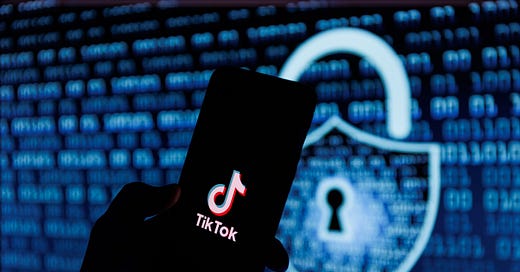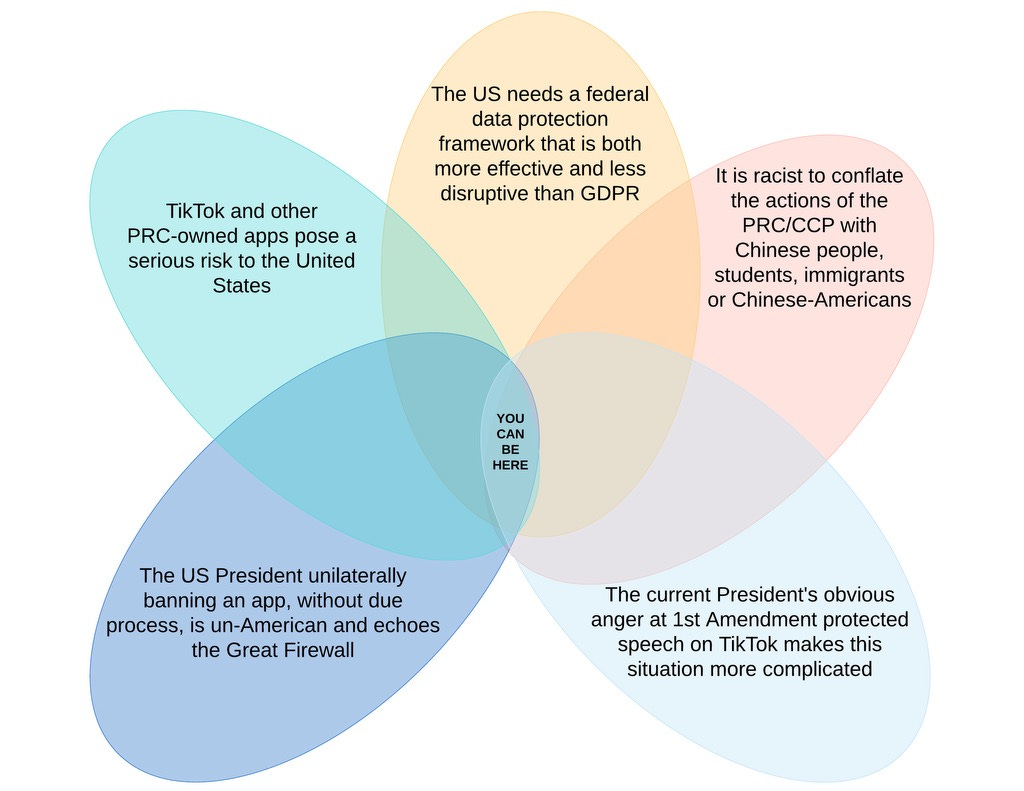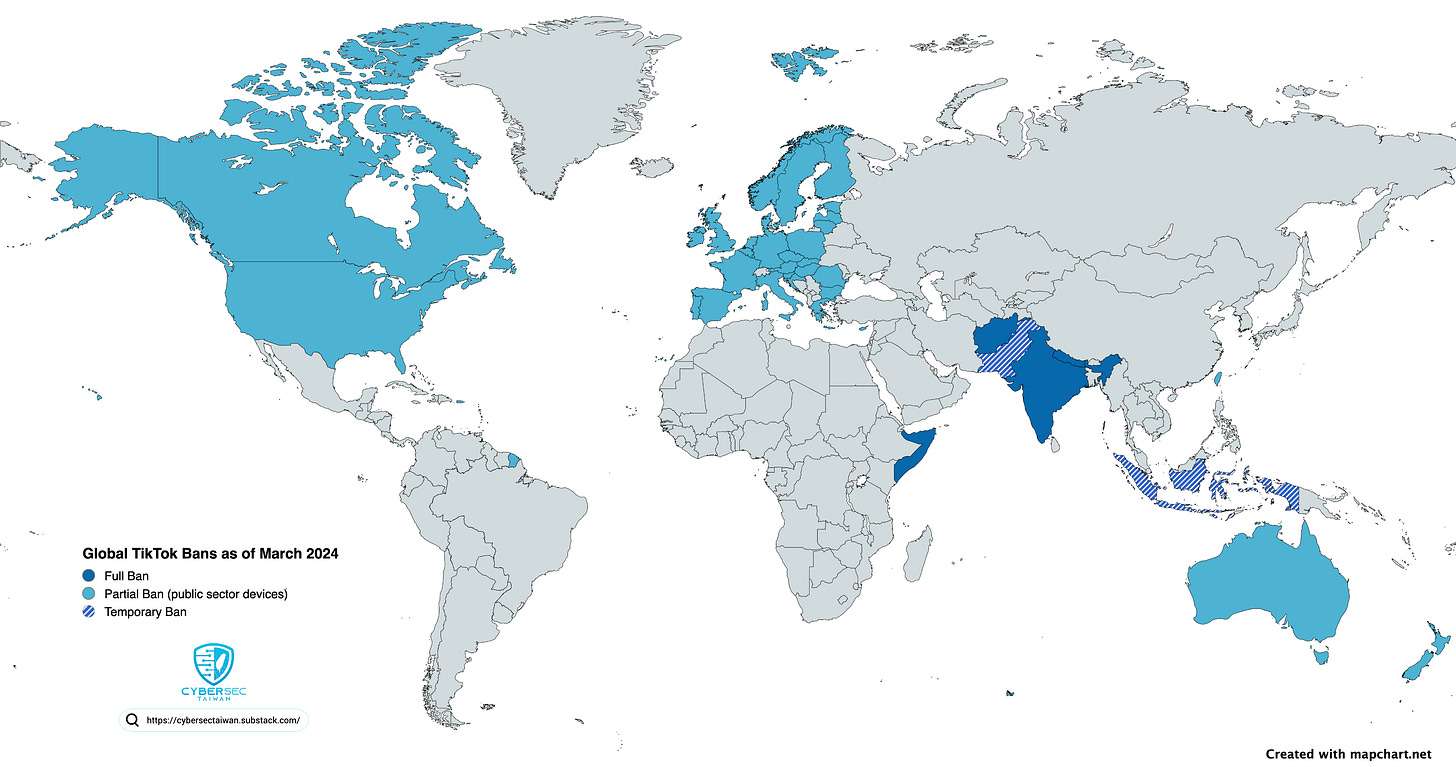Taiwan's TikTok Security Debate
Navigating Security Risks and Geopolitical Dynamics
Overview: A Return to the TikTok Security Concern
There are few social media platforms that have captivated global audiences as profoundly as TikTok. From viral dance trends to contentious political discussions, the app has seamlessly integrated into the daily routines of millions worldwide. Yet, beneath its surface of light-hearted entertainment lies a blackhole of geopolitical tensions, data privacy concerns, and intricate political dynamics.
The recent reignition of the TikTok national security debate, particularly in the Unites States and Taiwan, has brought these issues to the forefront once again, with potential serious consequences looming on the horizon.
A bill passed by the U.S. House of Representatives aims to potentially ban TikTok due to security risks posed by its Chinese ownership. The U.S. bill signals a shift towards a growing apprehension over the potential exploitation of social media platforms by foreign adversaries, particularly in the context of disinformation campaigns and election interference.
At the same time, Taiwan grapples with its own regulatory approach, with discussions underway to update regulations surrounding the platform.
As discussions intensify, governments and users alike are forced to reassess the platform's impact and implications, navigating a delicate balance between entertainment and national security.
Analysis: Highlighting the Concern(s)
While data privacy and secure storage are serious concerns, the heart of the TikTok debate rests among the tension between freedom of expression and national security. Although TikTok vehemently denies allegations of sharing user data with the Chinese government, concerns persist over its susceptibility to Chinese Communist Party (CCP) influence.
In Taiwan, the debate takes on added significance against the backdrop of cross-strait relations and democratic values. The Digital Ministry's recent classification of TikTok as a "hazardous product" underscores the government's proactive stance on safeguarding national security. However, the challenge lies in balancing regulatory measures with respect for individual liberties and the principles of an open society.
A detailed report, titled, “Why is TikTok a Security Threat? A Technological Authoritarianism Perspective”, featured in Vole 12 Issue 3 of the Institute for National Defense and Security Research (INDSR)’s Defense Security Brief, authored by Shu-Ting Liu, addresses the intricate dynamics at play. Liu's analysis highlights the concept of "technological authoritarianism," wherein authoritarian regimes utilize technology to consolidate control and influence society. In the case of TikTok, concerns extend beyond data privacy to encompass its potential as a political tool wielded by the CCP.
The TikTok debate also highlights broader issues surrounding media literacy, political communication, and democratic governance. Insights from the IORG Weekly Report No. 69 by the IORG Information Environment Database underscore the role of social media in shaping political discourse and public opinion. The IORG reveals how controversial issues, including recent incidents involving Taiwanese political leaders, are manipulated across platforms to amplify certain narratives, often favoring opposition parties and contributing to societal polarization.

As a result, the proliferation of false and propaganda-based information on social media platforms underscores the importance of critical thinking and digital literacy skills in navigating the digital landscape.
Here are some notable organizations in Taiwan actively combatting disinformation and promoting digital literacy:
Broader Impact: TikTok as a Catalyst
The previous significant TikTok security debate, which garnered widespread attention, occurred in mid-2020 during the Trump administration’s consideration of a total ban in the United States. During this period, one particularly notable perspective emerged from a tweet by renowned cybersecurity policy expert Alex Stamos, posted on Twitter (now X).
Although the tweet is no longer accessible on Stamos's X account, the accompanying image he shared emphasized the multifaceted nature of the issue, including the need for tougher data policy, the threat of authoritarian censorship in a democracy, and the need to address serious security risks posed by the social media platform. This retrospective serves as a poignant reminder of the enduring challenges inherent in the ongoing discourse surrounding TikTok, offering valuable insights into the current state of the debate.
Looking forward, the potential ban of TikTok carries many broad implications that warrant careful consideration. Foremost among these is the impact on diplomatic relations between countries. Should a ban be perceived as politically motivated or discriminatory, it has the potential to strain diplomatic ties and escalate tensions between nations.
Moreover, the economic fallout from such a ban is far-reaching, extending beyond the confines of TikTok itself. Disruption within digital ecosystems could have cascading effects, impacting businesses, content creators, and advertisers who rely on the platform for marketing and revenue generation. Imposing restrictions on TikTok may not only stifle technological innovation but also limit competition and diversity in the digital marketplace, potentially constraining user choice and creativity in the long term.
In addition to diplomatic and economic ramifications, a ban on TikTok raises deep consideration toward freedom of expression and censorship for democracies. The precedent set by such a ban could pave the way for increased government intervention in online speech and content moderation, sparking debate on digital rights and data protection (a much needed debate, as Stamos suggests). As a result, the ban could serve as a catalyst for discussions surrounding global internet governance and sovereignty. As tensions mount between national regulations and the borderless nature of the internet, the need for international cooperation to address cross-border challenges in cyberspace becomes increasingly evident.
For Taiwan, where geopolitical tensions and cybersecurity concerns loom large, the decision regarding TikTok's fate continues to maintain significant implications. As Taiwan navigates its diplomatic relations and economic stability among geopolitical uncertainties, the outcome of the TikTok security debate will undoubtedly shape the trajectory of technological innovation and national security in the region.
CyberSec Taiwan
About CyberSec Taiwan
Your source for the latest news and analysis on Taiwan-centric cybersecurity.








